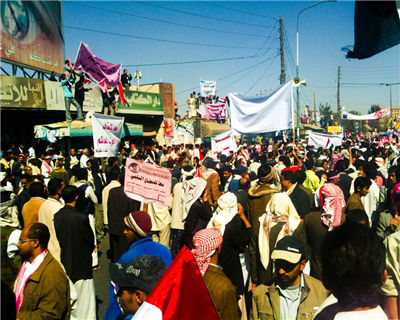Key political risks in the Middle East and North Africa
President Abdel-Fattah al-Sisi faces a range of challenges including reducing Egypt's dependency on Gulf aid, cutting government spending through subsidy reform, restoring investor confidence despite a growing insurgency, quelling recurrent strikes, and avoiding mass economically-motivated unrest.

Egypt
President Abdel-Fattah al-Sisi faces a range of challenges including reducing Egypt's dependency on Gulf aid, cutting government spending through subsidy reform, restoring investor confidence despite a growing insurgency, quelling recurrent strikes, and avoiding mass economically-motivated unrest. The severe difficulty of meeting these conflicting demands means that the Army is likely to lose popularity during a Sisi presidency, undermining government stability. While Egypt's public finances are expected to remain under pressure, the authorities' reform measures and stimulus plans are aimed at gradually reducing the fiscal gap and jump-starting the beleaguered economy. Egypt's foreign reserves have broadly stabilised, with Gulf aid providing the underlying support. But, contractors face severe non-payment risks until Egypt's aid dependency is resolved. The country's energy bill should be less of a burden with low global oil prices expected in the two-year outlook and, therefore, a reduced drain on the foreign reserve position, while providing some relief to public finances. Meanwhile, Islamistbacked IED and shooting attacks are likely and a two-front Sinai and western Egypt insurgency is a risk.
Turkey
The consecutive re-elections of the Justice and Development Party (Adalet ve Kalkınma Partisi: AKP) in 2007 and 2011 brought stability and continuity to Turkish politics. An authoritarian trend in recent years and a concomitant rise in societal polarisation have eclipsed the party's positive track record. President Erdoğan, the party's founder, is now likely to exploit the popular momentum he gained following the failed coup on 15 July 2016 and push for constitutional changes providing the presidency with executive power, further straining societal tensions.
The AKP government is likely to continue exploiting the 15 July coup attempt to purge the military, judiciary, and state bureaucracy from political opponents. Although Erdoğan remains unlikely to de-escalate Turkey's fight against the Partiya Karkerên Kurdistan (PKK), the military's loss of morale and the postcoup purges are likely to undermine its fight against the militant group, while rendering the top command more pliable to Erdoğan's wishes. There is a risk of high-casualty attacks by the Islamic State and PKK affiliates in Istanbul and Ankara.
Turkey's short-term sovereign risk is supported by a declining current-account deficit and high official reserve levels. Low public debt and reasonable fiscal deficits also support a fairly benign short-term risk. However, the outlook for the rating is Negative, reflecting liquidity pressures, which could dramatically intensify should net capital inflows turn sharply outward. The biggest short-term risk to liquidity is a potential reversal of these capital flows.
Israel
Prime Minister Benjamin Netanyahu's rightwing government coalition is likely to prioritise anti-terrorism efforts and the maintenance of the status-quo, to the detriment of relations with the Arab-Israeli and Palestinian populations. Israel's missile defence systems are likely to intercept most rockets from Gaza. Hizbullah, however, is likely to be able to fire rockets at rates that would at least partially overwhelm their capacity, indicating a severe risk in the event of another Israel-Hizbullah war in Lebanon. This is unlikely in the one-year outlook due to mutual deterrence, although there remains the potential for escalation through miscalculation. Coalition partners are likely to pressure Prime Minister Netanyahu to extract support for their special interests, including controversial policies such as expansion of settlement construction and curbs on NGO activity. Government efforts to politicise the institutions of state, including the judiciary and armed forces, are likely to prompt increased social unrest between Israel's leftwing secular tradition and right-wing and religious activists.
Israel’s short-term sovereign credit risk is very low. Substantial foreign-exchange reserves and a healthy current-account surplus help to minimise the risk to Israel's external liquidity position and solidify Israel’s financial footing. Short-term external debt for the private sector is somewhat high, but can usually be rolled over fairly easily.
Jordan
The US and Gulf states are invested in Jordan's stability, given its location, moderation, and counter-terrorism capabilities. The 20 September elections will likely again produce a parliament pliant to the royal court and there is no opposition capable of threatening the power of King Abdullah II. Jordan's economic weakness and the strain from Syrian refugees are key longterm threats.
Jordan's weak financial position has been exacerbated by the refugee crisis, making payment delays and localised economically motivated protests likely. Economic growth is likely to remain weak in 2016-17, as a result of fiscal retrenchment and regional and domestic political uncertainty. Nevertheless, the US and allies will probably provide sufficient financial aid to the Hashemite monarchy to prevent persistent or coordinated protests from becoming destabilising. Inter-state war with Israel or Syria is unlikely, although skirmishes along the Syrian border are probable. The conflicts in Iraq and Syria are increasing the IED capabilities of Jordanian jihadists. Recurring strikes are likely to affect ports, phosphates, transport, and manufacturing.
Saudi Arabia
The division of power between the crown prince, in charge of political and security affairs, and deputy crown prince, overseeing everything else, is unlikely to change in the six-month outlook. The latter has positioned himself as a change agent, willing to marginalise the ruling family and the clerical establishment's influence over government. The monarchy's priorities are to contain an Islamic State insurgency, ensure the clerical establishment remains supportive, and deliver economic growth. Should the economic slowdown adversely affect youth employment and the monarchy’s ability to redistribute patronage, the risk of a serious threat to state stability emerging over the coming year would grow sharply. The Islamic State campaign has progressed to more ambitious attacks on security force targets. Successful attacks on secure assets remain unlikely.
Saudi Arabia's short-term sovereign credit currently faces limited risk, with its rating underpinned by its vast petroleum reserves and strong external finances. The government has accumulated large reserves of hard-currency and the country has huge additional liquid assets overseas. The weak oil price outlook will continue to pressure Saudi Arabia's external balances over the next 12 months, but the kingdom is expected to lean on its significant financial buffers to manage through the low price environment. Moreover, the sovereign's high-quality credit rating allows it easily to meet any short-term financing needs by readily tapping international capital markets.
About IHS Economics and Country Risk
IHS ECR leverages the company’s detailed qualitative and quantitative analysis of 204 countries, covering political, economic, legal, tax and security risks.
Intelligence cut-off date: 4 October 2016.





